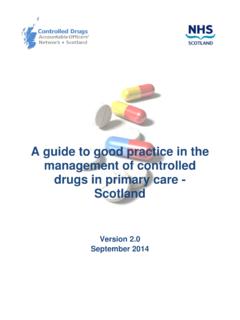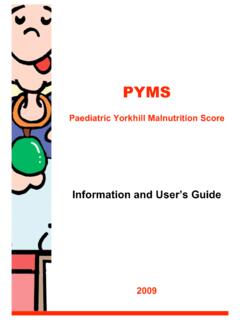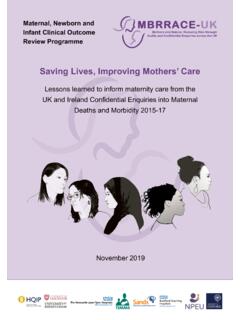Transcription of Supporting People with Dementia in Acute Care
1 Supporting People with Dementia in Acute Care Learning Resource NHS Education for Scotland 2016 You can copy or reproduce the information in this document for use within NHSS cotland and for non-commercial educational purposes. Use of this document for commercial purposes is permitted only with the written permission of 4 Module 1 Understanding Dementia 9 Module 2 Person-centred assessment and screening 25 Module 3 Holistic approaches to Supporting the healthcare needs of People with Dementia 45 Module 4 The care experience 71 Introduction4 Supporting People with Dementia in Acute CareWelcome! Welcome to the Supporting People with Dementia in Acute Care Learning Resource.
2 The resource has been designed for Acute general hospital staff to help them develop their abilities in Supporting People with Dementia , their families and carers. The learning in the resource will help you develop the knowledge and skills set out at the Dementia Skilled Practice Level of Promoting Excellence: a framework for all health and social services staff working with People with Dementia , their families and note this resource is also available as e-learning via LearnPro. Accessing the LearnPro version will enable you to make links to wider learning resources and assessment activities and record completion of your learning. Why is Dementia so important in Acute general hospitals?As life expectancy rises, more and more People in Scotland will develop Dementia .
3 Dementia is not a condition that only affects older People , however. People in their 40s or 50s, or even younger, can develop Dementia . Dementia also has a profound impact on families, friends and wider networks of People and they too need our support to help them achieve the best quality of life. Consider some of these issues. nApproximately 90,000 People in Scotland were living with Dementia in 2015. nThe number of People over 65 is predicted to increase significantly over the next 20 years. It is likely that the numbers of People with a diagnosis of Dementia in Scotland will also increase considerably. nIt is estimated that up to 70% of Acute general hospital beds in 2016 will be occupied by older People . Approximately two-thirds are currently occupied by People over 65, in whom the prevalence of Dementia is around 30%.
4 NApproximately 40% of People over 75 who are admitted to hospital have Dementia . These numbers may change over the years, as will many of the statistics given in this resource. It is important that you keep up to date by checking the websites of the scottish Government or Alzheimer these statistics , it is essential that all staff working in Acute general hospitals and emergency departments are able to recognise when a person may have Dementia and are confident of their ability to provide appropriate support, care and treatment. Particular issues for People with Dementia in Acute general hospitals People with Dementia enter Acute care environments for the same reasons as other People . Most of the reasons are not related to Dementia , but the experience is likely to present a greater challenge to People with Dementia than for some others.
5 Along with the distress caused by illness or injury, the trauma of facing such a change in their daily life and routine can also have an impact and contribute to poorer older person with Dementia may be affected by any number of other long-term conditions, such as diabetes, Parkinson s disease , chronic obstructive airways disease , heart disease and arthritis. These multiple health problems, alongside Dementia , are often exacerbated by dehydration, malnutrition, constipation and infection, placing the person Introduction5 Introductionat greater risk of unplanned admission to hospital. An Acute general hospital can be a disorientating and often frightening place for anyone, but this may be considerably worse for someone who has Dementia . The stress of an unfamiliar environment and the constant challenge the person faces in understanding what is happening can be overwhelming.
6 The risks of distress and deterioration in health and wellbeing consequently increase. Evidence suggests that care, treatment and outcomes of hospital admission are markedly poorer for People with Dementia than for those without. Several potential factors may contribute to this, including: npressures of Acute care; nthe unique and complex needs of the person with Dementia not being recognised; norganisational systems and processes Acute general hospitals are fast-paced and intense, with a focus on rapid responses, meeting Acute needs and achieving discharge as soon as can lead to a number of risks for People with Dementia , including: nprolonged stay in hospital; nincreased complications, such as pressure ulcers, falls and delirium; nincreased adverse drug reactions; nloss of previous abilities and increased levels of dependence; nincidents of incontinence that can become permanent; ndecline in cognitive function; nan increased likelihood of admission to a care home.
7 Nincreased morbity and mortality. A further risk is that the person s level of cognitive impairment may be misjudged with a focus on Dementia rather than on the medical co-morbidities and the impact of delirium and frailty. Worsening confusion and disorientation in older People , and those People known to have Dementia , often go unnoticed in a busy Acute care environment and may be attributed to the person s Acute is the background to this resource? Scotland s National Dementia StrategiesNational Dementia strategies have been developed and implemented in Scotland since 2010. Key elements Supporting implementation include the Promoting Excellence framework and the Standards of Care for Dementia in Scotland. Together, these documents represent a means of making sure that improving the quality of life for People with Dementia is at the heart of what we ExcellencePromoting Excellence describes various levels of knowledge and skills required by ALL of the health and social service workforce.
8 The levels are: nDementia Informed Practice Level nDementia Skilled Practice Level nEnhanced Dementia Practice Level nExpertise in Dementia Practice People with Dementia in Acute CareThis resource is designed to help Acute care staff achieve the knowledge and skills set out at the Dementia Skilled Practice Level of Promoting Excellence. Before using the resource individually or facilitating or delivering training based on it, you should ensure you have gained the knowledge and skills set out at Dementia Informed Practice Level. We have produced the Informed about Dementia : Improving Practice DVD to enable this. If you have already seen the DVD or have used it in a learning session, you may want to refresh your memory it provides a starting point for this resource.
9 Acute Care and Scotland s National Dementia Strategies Improving experiences and outcomes for People with Dementia in Acute care has been, and remains, a priority in Scotland s National Dementia Strategy. It is supported by a range of national and local activities, including: nthe establishment of Alzheimer Scotland Nurse Consultant posts; nthe establishment of Alzheimer Scotland Allied Health Professional (AHP) Consultant posts; nthe National Dementia Champions Programme. The scottish Government also published the 10 Dementia Care Actions for Acute General Hospitals, with much activity taking place to support is the resource structured?The learning resource has four modules. Learning outcomes and activities have been written to reflect Level 7 of the scottish Credit and Qualifications Framework.
10 The modules include suggestions for further learning that will help you explore issues in greater depth. The modules are:Module 1: Understanding dementiaModule 2: Person-centred assessment and screening Module 3: Holistic approaches to Supporting the healthcare needs of People with Dementia Module 4: The care experienceWe use different types of learning activity throughout the resource to help you reflect on how you can best support People with Dementia , their families and carers, and put your learning into practice. The activities play a key part in helping you develop the knowledge, skills and attitudes that are central to your role. The focus is on practical application of the learning, reflective practice and putting learning into action. Introduction7 IntroductionThe 10 Care Actions We will refer to the 10 Care Actions throughout this People with Dementia in Acute CareHow should the resource be used?











